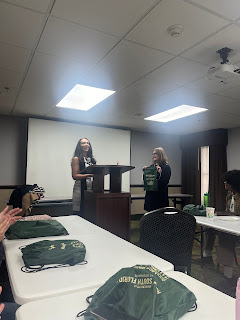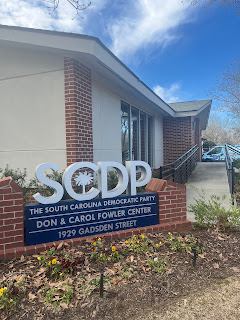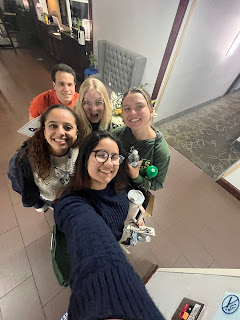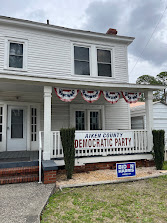Media Day + South Carolina Democrats
Monday, President's Day in 2024! I start my 4th day on the Road to the White House trip to the South Carolina Presidential Primary with AP Reporter Meg Carkern. She is following the Nikki Haley campaign as they travel around her home state of South Carolina trying to save the former governor's campaign. She began reporting on Nikki Haley in 2010. Some notes the reporter shared with us that these campaign stories and cycles have gone from 2 years before the election to as far as 4 years out as the first story regarding the 2024 election was published in 2021. Something that helps reporters in South Carolina is the fact that it is a relatively cheap media state. The Biden-Harris campaign did a lot of outreach through black radio stations to help increase turnout. Though former President Trump has always been popular in the state, there has been a notable shift in the republican party here from the "Bush" era Republicans to a populist Republican which encompasses the Maga following and that was only 8 years ago. It was so interesting to learn about the life of someone who is a part of the media rather than people who sit on the receiving end and complain about the media. I then spent the rest of my day with the South Carolina Democratic Party. The first thing was letting us know how well of a relationship they had with their counterparts across the aisle. But we also got to learn about the leadership that runs the South Carolina Democrats. The executive director had also run the Oklahoma Democrats, then the DNC, and now South Carolina. Some notable things I took from learning about how Democratic politics work in the South. After 2008 instead of the parties paying for the primaries they came together to have the state pay for them and arrange the primary as it was the primary for Obama vs Romney the governor vetoed it originally and the parties then hired a private lobbyist to fix it. This made it so both parties have the same hours available for voting and the same weekdays including Saturday and 2 weeks of early voting. This made it the only state to have flexibility in choosing a date for the primaries rather than the state choosing. The new chair of the party was the first black woman to be the chair and was the executive director beforehand but left to be on the Bernie Campaign but when Hilary was the nominee she returned to the party. Some important things happened to her as chair, and having South Carolina be moved first on the democratic side raised questions. She had the party vote in the primary to explain WHY it is important to be moved to the front. This was to be able to hear from Black, young, old, city, and rural voters to all be a part of the decision process when choosing a president. It matched the demographics of the party better than traditional Iowa and New Hampshire.





Comments
Post a Comment